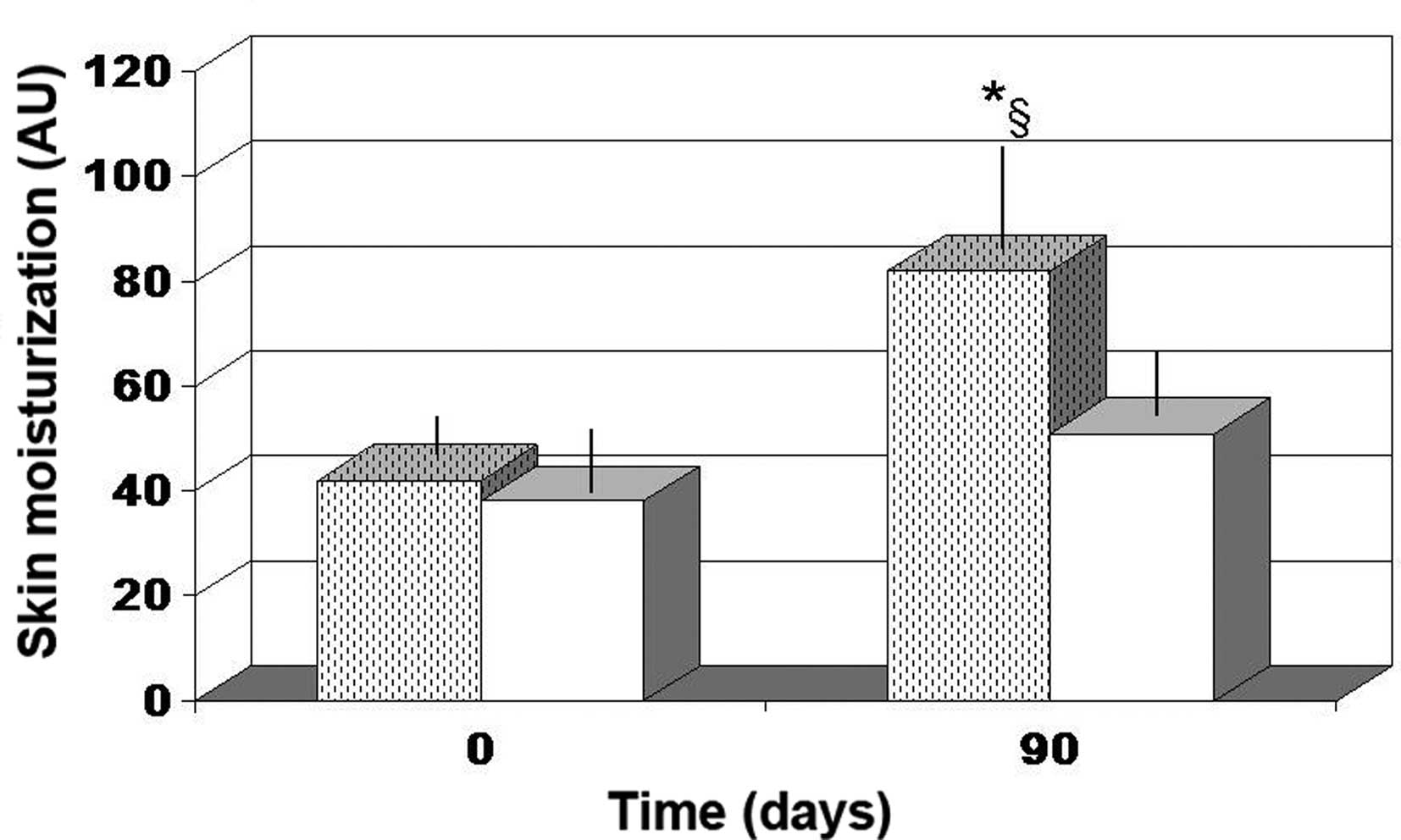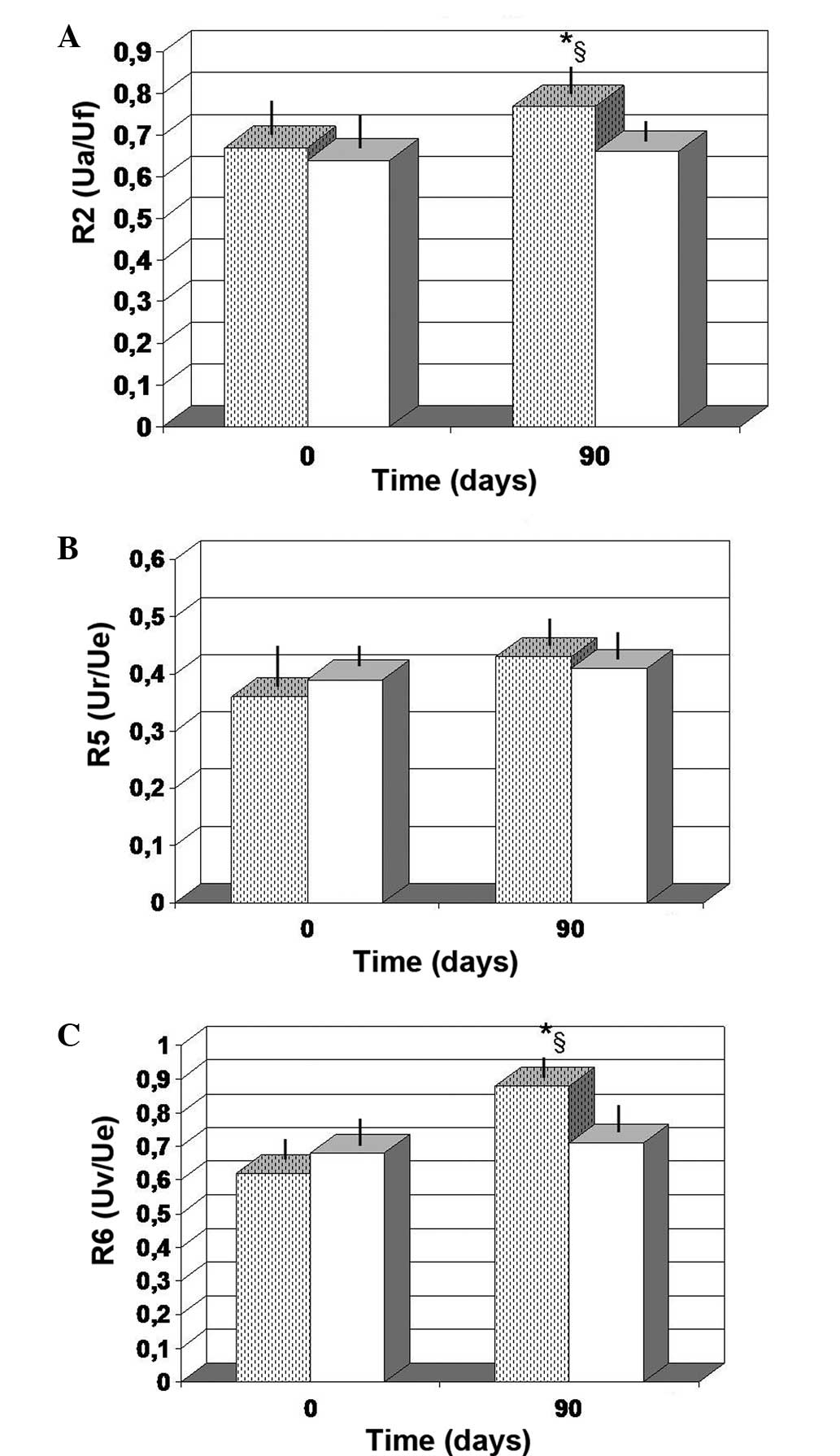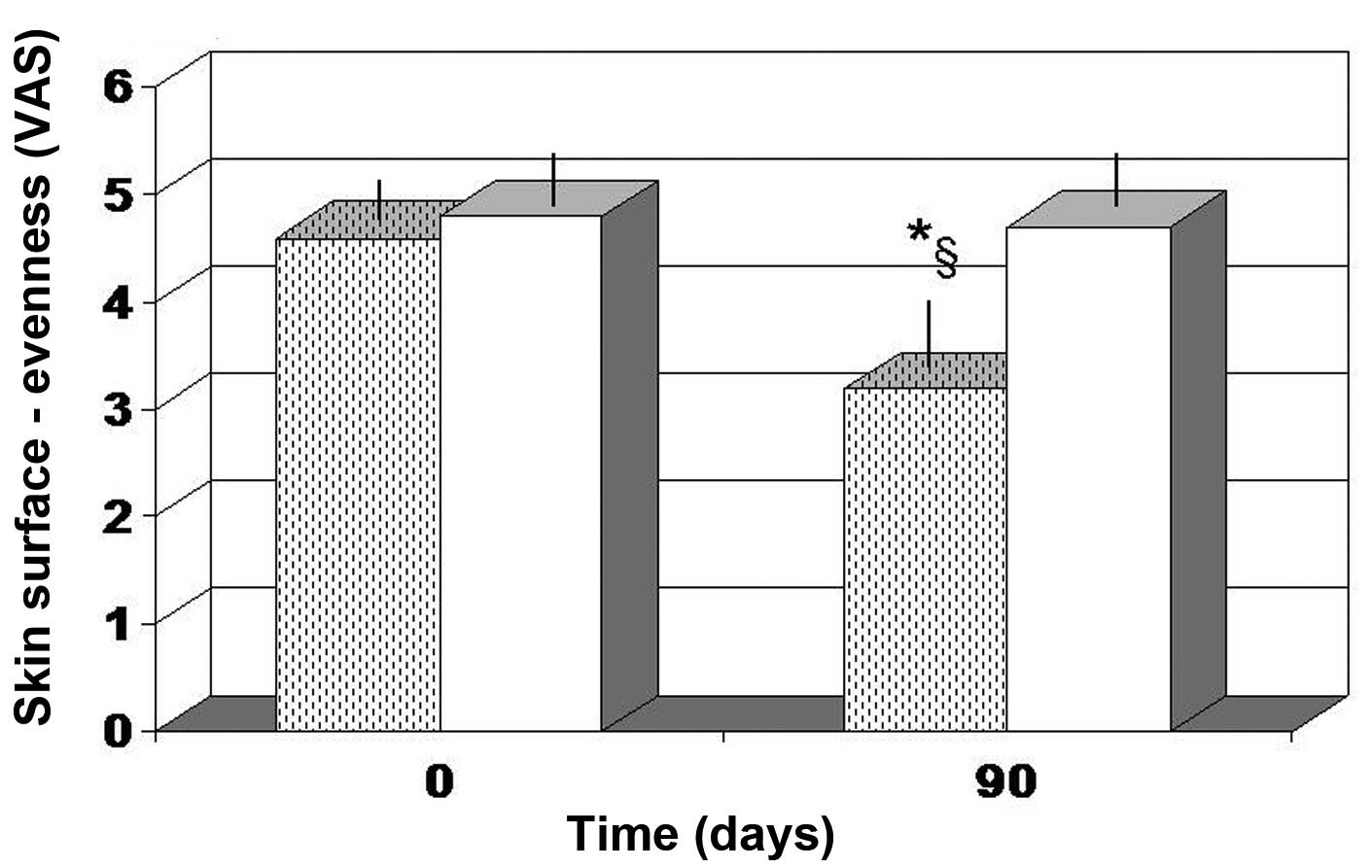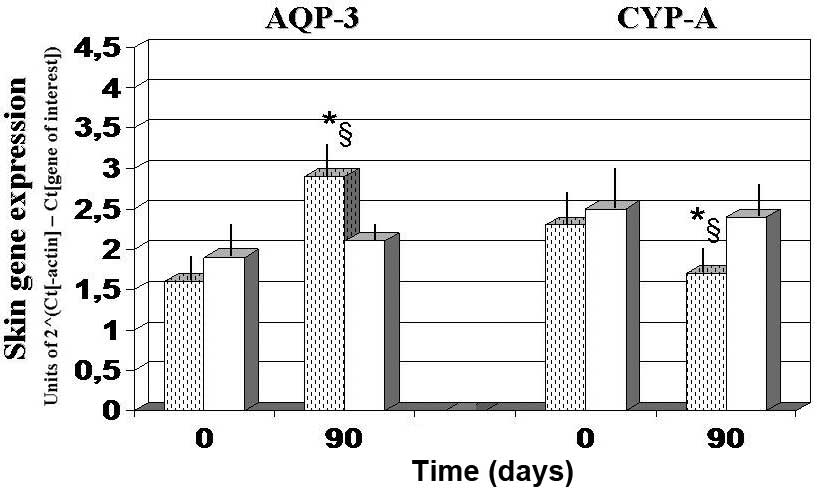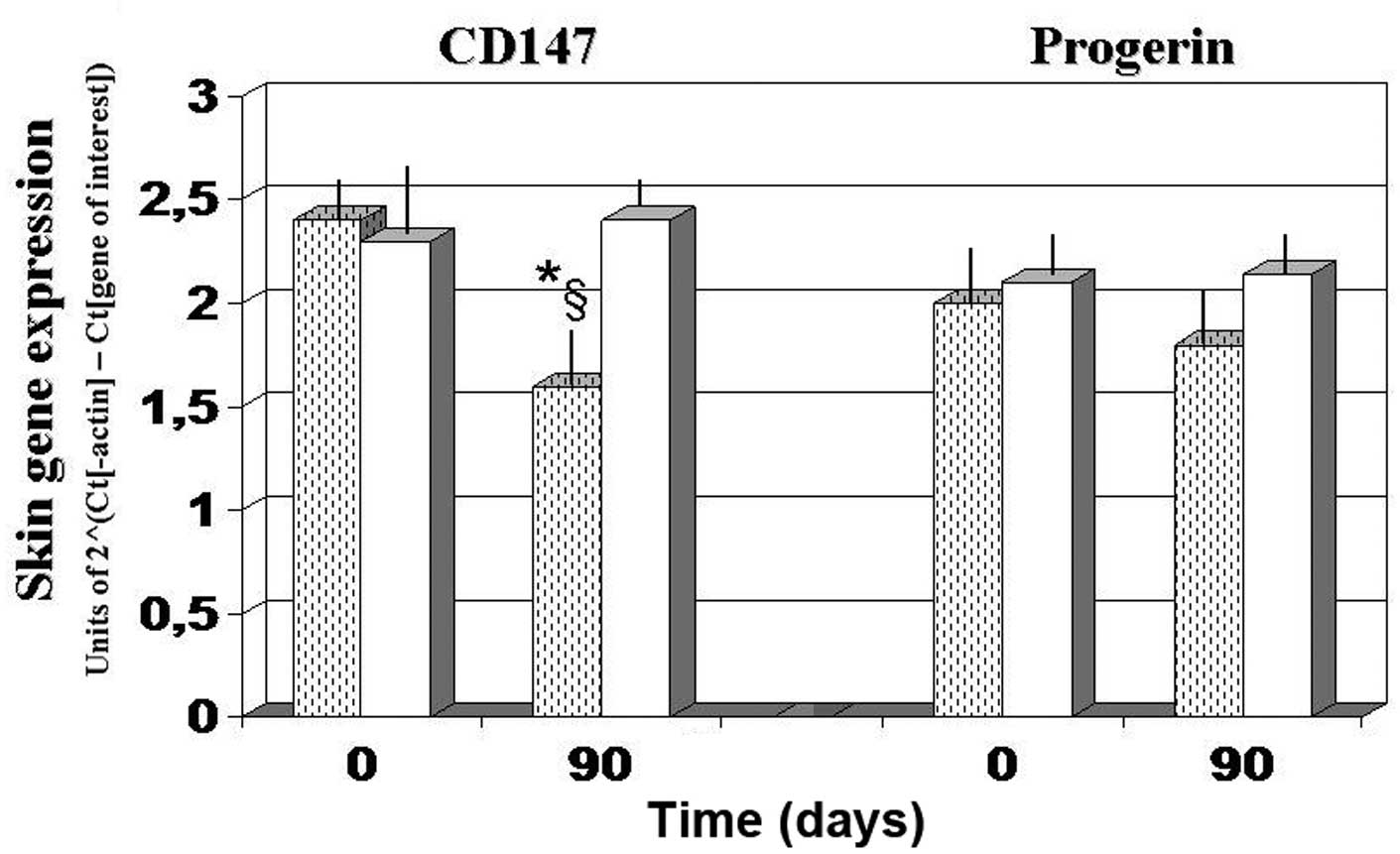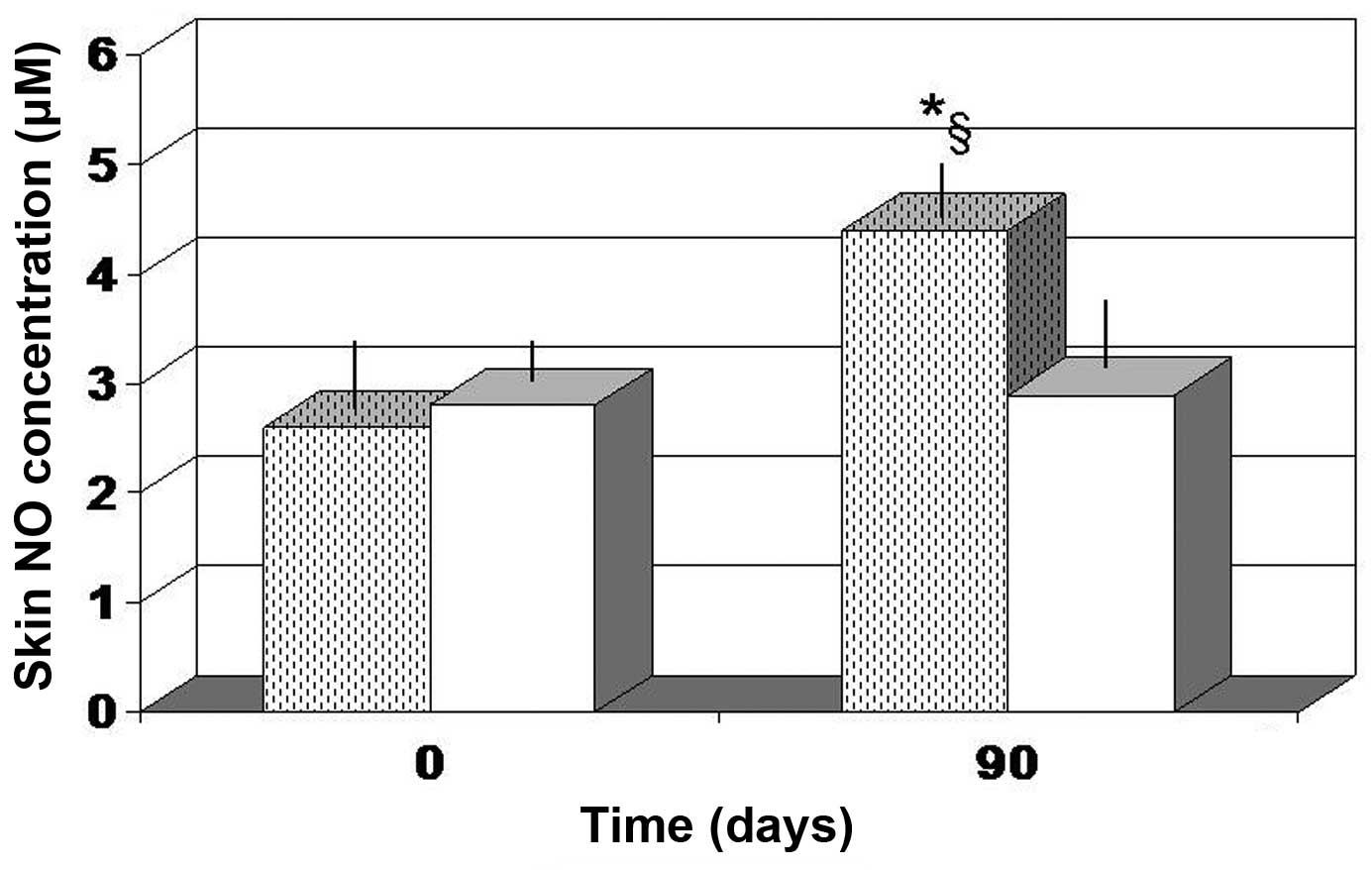|
1
|
Jones DP: Redox theory of aging. Redox
Biol. 5:71–79. 2015. View Article : Google Scholar : PubMed/NCBI
|
|
2
|
Kammeyer A and Luiten RM: Oxidation events
and skin aging. Ageing Res Rev. 1:16–29. 2015. View Article : Google Scholar
|
|
3
|
Choi CM and Berson DS: Cosmeceuticals.
Semin Cutan Med Surg. 25:163–168. 2006. View Article : Google Scholar : PubMed/NCBI
|
|
4
|
Katiyar SK: Green tea prevents
non-melanoma skin cancer by enhancing DNA repair. Arch Biochem
Biophys. 508:152–158. 2011. View Article : Google Scholar : PubMed/NCBI
|
|
5
|
Udompataikul M, Sripiroj P and
Palungwachira P: An oral nutra-ceutical containing antioxidants,
minerals and glycosaminoglycans improves skin roughness and fine
wrinkles. Int J Cosmet Sci. 31:427–435. 2009. View Article : Google Scholar : PubMed/NCBI
|
|
6
|
Izumi T, Saito M, Obata A, Arii M,
Yamaguchi H and Matsuyama A: Oral intake of soy isoflavone aglycone
improves the aged skin in adult women. J Nutr Sci Vitaminol
(Tokyo). 53:57–62. 2007. View Article : Google Scholar : PubMed/NCBI
|
|
7
|
Natarajan VT, Ganju P, Ramkumar A, Grover
R and Gokhale R: Multifaceted pathways protect human skin from UV
radiation. Nat Chem Biol. 10:542–551. 2014. View Article : Google Scholar : PubMed/NCBI
|
|
8
|
Uitto J: The role of elastin and collagen
in cutaneous aging: Intrinsic aging versus photoexposure. J Drugs
Dermatol. 7(Suppl 2): S12–S6. 2008.PubMed/NCBI
|
|
9
|
Rabe JH, Mamelak AJ, McElgunn PJ, Morison
WL and Sauder DN: Photoaging: Mechanisms and repair. J Am Acad
Dermatol. 55:1–19. 2006. View Article : Google Scholar : PubMed/NCBI
|
|
10
|
Yaar M and Gilchrest BA: Photoageing:
mechanism, prevention and therapy. Br J Dermatol. 157:874–887.
2007. View Article : Google Scholar : PubMed/NCBI
|
|
11
|
Melnikova VO and Ananthaswamy HN: Cellular
and molecular events leading to the development of skin cancer.
Mutat Res. 571:91–106. 2005. View Article : Google Scholar : PubMed/NCBI
|
|
12
|
Makrantonaki E and Zouboulis CC: German
National Genome Research Network. 2 The skin as a mirror of the
aging process in the human organism-state of the art and results of
the aging research in the German National Genome Research Network 2
(NGFN-2). Exp Gerontol. 42:879–886. 2007. View Article : Google Scholar : PubMed/NCBI
|
|
13
|
Makrantonaki E, Schonknecht P, Hossini AM,
Kaiser E, Katsouli MM, Adjaye J, Schröder J and Zouboulis CC: Skin
and brain age together: The role of hormones in the ageing process.
Exp Gerontol. 45:801–813. 2010. View Article : Google Scholar : PubMed/NCBI
|
|
14
|
Buonocore D, Lazzeretti A, Tocabens P,
Nobile V, Cestone E, Santin G, Bottone MG and Marzatico F:
Resveratrol-procyanidin blend: Nutraceutical and antiaging efficacy
evaluated in a placebo-controlled, double-blind study. Clin Cosmet
Investig Dermatol. 5:159–165. 2012. View Article : Google Scholar : PubMed/NCBI
|
|
15
|
Gruber JV and Holtz R: Examining the
genomic influence of skin antioxidants in vitro. Mediators
Inflamm. 2010:2304502010. View Article : Google Scholar : PubMed/NCBI
|
|
16
|
Hara-Chikuma M and Verkman AS: Aquaporin-3
facilitates epidermal cell migration and proliferation during wound
healing. J Mol Med (Berl). 86:221–231. 2008. View Article : Google Scholar : PubMed/NCBI
|
|
17
|
Han W, Soltani K, Ming M and He YY:
Deregulation of XPC and CypA by cyclosporin A. An
immunosuppression-independent mechanism of skin carcinogenesis.
Cancer Prev Res (Phila). 5:1155–1162. 2012. View Article : Google Scholar : PubMed/NCBI
|
|
18
|
Satoh K, Satoh T, Kikuchi N, Omura J,
Kurosawa R, Suzuki K, Sugimura K, Aoki T, Nochioka K, Tatebe S, et
al: Basigin mediates pulmonary hypertension by promoting
inflammation and vascular smooth muscle cell proliferation. Circ
Res. 115:738–750. 2014. View Article : Google Scholar : PubMed/NCBI
|
|
19
|
Ramachandran S, Venugopal A, Kutty VR, A
V, G D, Chitrasree V, Mullassari A, Pratapchandran NS, Santosh KR,
Pillai MR and Kartha CC: Plasma level of cyclophilin A is increased
in patients with type 2 diabetes mellitus and suggests presence of
vascular disease. Cardiovasc Diabetol. 13:382014. View Article : Google Scholar : PubMed/NCBI
|
|
20
|
Iacono KT, Brown AL, Greene MI and Saouaf
SJ: CD147 immunoglobulin superfamily receptor function and role in
pathology. Exp Mol Pathol. 83:283–295. 2007. View Article : Google Scholar : PubMed/NCBI
|
|
21
|
Takeuchi H and Rünger TM: Longwave UV
light induces the aging-associated progerin. J Invest Dermatol.
133:1857–1862. 2013. View Article : Google Scholar : PubMed/NCBI
|
|
22
|
Marotta F, Yoshida C, Barreto R, Naito Y
and Packer L: Oxidative-inflammatory damage in cirrhosis: Effect of
vitamin E and a fermented papaya preparation. J Gastroenterol
Hepatol. 22:697–703. 2007. View Article : Google Scholar : PubMed/NCBI
|
|
23
|
Aruoma OI, Colognato R, Fontana I, Gartlon
J, Migliore L, Koike K, Coecke S, Lamy E, Mersch-Sundermann V,
Laurenza I, et al: Molecular effects of fermented papaya
preparation on oxidative damage, MAP Kinase activation and
modulation of the benzo[a]pyrene mediated genotoxicity. Biofactors.
26:147–159. 2006. View Article : Google Scholar : PubMed/NCBI
|
|
24
|
Bertuccelli G, Marotta F, Zerbinati N,
Cabeca A, He F, Jain S, Lorenzetti A, Yadav H, Milazzo M, Calabrese
F, et al: Iron supplementation in young iron-deficient females
causes gastrointestinal redox imbalance: Protective effect of a
fermented nutraceutical. J Biol Regul Homeost Agents. 28:53–63.
2014.PubMed/NCBI
|
|
25
|
Sachdeva S: Fitzpatrick skin typing:
Applications in dermatology. Indian J Dermatol Venereol Leprol.
75:93–96. 2009. View Article : Google Scholar : PubMed/NCBI
|
|
26
|
Clarys P, Barel AO and Gabard B:
Non-invasive electrical measurements for the evaluation of the
hydration state of the skin: Comparison between three conventional
instruments - the Corneometer, the Skicon, and the Nova DPM. Skin
Res Technol. 5:14–20. 1999. View Article : Google Scholar
|
|
27
|
Courage W: Hardware and measuring
principle: corneometer. Bioengineering of the Skin: Water and the
Stratum Corneum. Elsner P, Berardesca E and Maibach HI: (Boca
Raton, FL). CRC Press. 1994.
|
|
28
|
Barel AO, Courage W and Clarys P: Suction
method for measurement of skin mechanical properties: The
cutometer. Handbook of Non-invasive methods and the Skin. Serup J
and Jemec GBE: (Boca Raton, FL). CRC Press. 1995.
|
|
29
|
Han A, Chien AL and Kang S: Photoaging.
Dermatol Clin. 32:291–299. 2014. View Article : Google Scholar : PubMed/NCBI
|
|
30
|
Wilhelm KP, Elsner P, Berardesca E and
Maibach HI: Bioengineering of the skin: Skin surface imaging and
analysis. Boca Raton, FL: CRC Press. 1996.
|
|
31
|
Luebberding S, Krueger N and Kerscher M:
Comparison of Validated Assessment Scales and 3D digital fringe
projection method to assess lifetime development of wrinkles in
men. Skin Res Technol. 20:30–36. 2014. View Article : Google Scholar : PubMed/NCBI
|
|
32
|
Ding TM, Chen J, Zhang ZX and Zhang YH:
The methods for determination of nitric oxide in vivo and
their applications. Yao Xue Jin Zhan. 29:221–226. 2005.(In
Chinese).
|
|
33
|
Bland JM and Altman DG: Applying the right
statistics: Analyses of measurement studies. Ultrasound Obstet
Gynecol. 22:85–93. 2003. View
Article : Google Scholar : PubMed/NCBI
|
|
34
|
Indo HP, Yen HC, Nakanishi I, Matsumoto K,
Tamura M, Nagano Y, Matsui H, Gusev O, Cornette R, Okuda T, et al:
A mitochondrial superoxide theory for oxidative stress diseases and
aging. J Clin Biochem Nutr. 56:1–7. 2015. View Article : Google Scholar : PubMed/NCBI
|
|
35
|
Vajapey R, Rini D, Walston J and Abadir P:
The impact of age-related dysregulation of the angiotensin system
on mitochondrial redox balance. Front Physiol. 5:4392014.
View Article : Google Scholar : PubMed/NCBI
|
|
36
|
Fulop T, Witkowski JM, Pawelec G, Alan C
and Larbi A: On the immunological theory of aging. Interdiscip Top
Gerontol. 39:163–176. 2014. View Article : Google Scholar : PubMed/NCBI
|
|
37
|
Poljšak B, Dahmane RG and Godić A:
Intrinsic skin aging: The role of oxidative stress. Acta
Dermatovenerol Alp Pannonica Adriat. 21:33–36. 2012.PubMed/NCBI
|
|
38
|
Godic A, Poljšak B, Adamic M and Dahmane
R: The role of antioxidants in skin cancer prevention and
treatment. Oxid Med Cell Longev. 2014:8604792014. View Article : Google Scholar : PubMed/NCBI
|
|
39
|
Lu CY, Lee HC, Fahn HJ and Wei YH:
Oxidative damage elicited by imbalance of free radical scavenging
enzymes is associated with large-scale mtDNA deletions in aging
human skin. Mutat Res. 423:11–21. 1999. View Article : Google Scholar : PubMed/NCBI
|
|
40
|
Cao C, Wan S, Jiang Q, Amaral A, Lu S, Hu
G, Bi Z, Kouttab N, Chu W and Wan Y: All-trans retinoic acid
attenuates ultraviolet radiation-induced down-regulation of
aquaporin-3 and water permeability in human keratinocytes. J Cell
Physiol. 215:506–516. 2008. View Article : Google Scholar : PubMed/NCBI
|
|
41
|
Wu Z, Uchi H, Morino-Koga S, Shi W and
Furue M: Resveratrol inhibition of human keratinocyte proliferation
via SIRT1/ARNT/ERK dependent downregulation of aquaporin 3. J
Dermatol Sci. 75:16–23. 2014. View Article : Google Scholar : PubMed/NCBI
|
|
42
|
Collard E and Roy S: Improved function of
diabetic wound-site macrophages and accelerated wound closure in
response to oral supplementation of a fermented papaya preparation.
Antioxid Redox Signal. 13:599–606. 2010. View Article : Google Scholar : PubMed/NCBI
|
|
43
|
Marotta F, Yadav H, Kumari A, Catanzaro R,
Jain S, Polimeni A, Lorenzetti A and Soresi V: Cardioprotective
effect of a biofermented nutraceutical on endothelial function in
healthy middle-aged subjects. Rejuvenation Res. 15:178–181. 2012.
View Article : Google Scholar : PubMed/NCBI
|
|
44
|
Lee J and Kim SS: An overview of
cyclophilins in human cancers. J Int Med Res. 38:1561–1574. 2010.
View Article : Google Scholar : PubMed/NCBI
|
|
45
|
Ayva SK, Karabulut AA, Akatli AN, Atasoy P
and Bozdogan O: Epithelial expression of extracellular matrix
metalloproteinase inducer/CD147 and matrix metalloproteinase-2 in
neoplasms and precursor lesions derived from cutaneous squamous
cells: An immunohistochemical study. Pathol Res Pract. 209:627–634.
2013. View Article : Google Scholar : PubMed/NCBI
|
|
46
|
Wang CH, Rong MY, Wang L, Ren Z, Chen LN,
Jia JF, Li XY, Wu ZB, Chen ZN and Zhu P: CD147 up-regulates
calcium-induced chemotaxis, adhesion ability and invasiveness of
human neutrophils via a TRPM-7-mediated mechanism. Rheumatology
(Oxford). 53:2288–2296. 2014. View Article : Google Scholar : PubMed/NCBI
|
|
47
|
Yurchenko V, Constant S, Eisenmesser E and
Bukrinsky M: Cyclophilin-CD147 interactions: A new target for
anti-inflammatory therapeutics. Clin Exp Immunol. 160:305–317.
2010. View Article : Google Scholar : PubMed/NCBI
|
|
48
|
Chen Y and Lyga J: Brain-skin connection:
Stress, inflammation and skin aging. Inflamm Allergy Drug Targets.
13:177–190. 2014. View Article : Google Scholar : PubMed/NCBI
|
|
49
|
Doppler K, Ebert S, Uçeyler N, Trenkwalder
C, Ebentheuer J, Volkmann J and Sommer C: Cutaneous neuropathy in
Parkinson's disease: A window into brain pathology. Acta
Neuropathol. 128:99–109. 2014. View Article : Google Scholar : PubMed/NCBI
|
|
50
|
Kanyenda LJ, Verdile G, Martins R, Meloni
BP, Chieng J, Mastaglia F, Laws SM, Anderton RS and Boulos S: Is
cholesterol and amyloid-β stress induced CD147 expression a
protective response? Evidence that extracellular cyclophilin a
mediated neuroprotection is reliant on CD147. J Alzheimers Dis.
39:545–556. 2014.PubMed/NCBI
|
|
51
|
Mantello M, Catanzaro R, He F, Bissi L,
Milazzo M, Lorenzetti A and Marotta F: Novel nutrigenomics avenues
in nutraceuticals use: The current status of fermented papaya
preparation. Bioactive Compounds: At the Frontier Between Nutrition
and Parmacology. Aguilar Villas MV and Otero C: Bentham Science.
2015.(in press).
|
|
52
|
del Hoyo P, García-Redondo A, de Bustos F,
Molina JA, Sayed Y, Alonso-Navarro H, Caballero L, Arenas J,
Agúndez JA and Jiménez-Jiménez FJ: Oxidative stress in skin
fibroblasts cultures from patients with Parkinson's disease. BMC
Neurol. 10:952010. View Article : Google Scholar : PubMed/NCBI
|
|
53
|
Musich PR and Zou Y: Genomic instability
and DNA damage responses in progeria arising from defective
maturation of prelamin A. Aging (Albany NY). 1:28–37.
2009.PubMed/NCBI
|
|
54
|
Martins RM, Siqueira S, Fonseca MJ and
Freitas LA: Skin penetration and photoprotection of topical
formulations containing benzophenone-3 solid lipid microparticles
prepared by the solvent-free spray-congealing technique. J
Microencapsul. 31:644–653. 2014. View Article : Google Scholar : PubMed/NCBI
|
|
55
|
Scalia S, Marchetti N and Bianchi A:
Comparative evaluation of different co-antioxidants on the
photochemical- and functional-stability of
epigallocatechin-3-gallate in topical creams exposed to simulated
sunlight. Molecules. 18:574–587. 2013. View Article : Google Scholar : PubMed/NCBI
|















